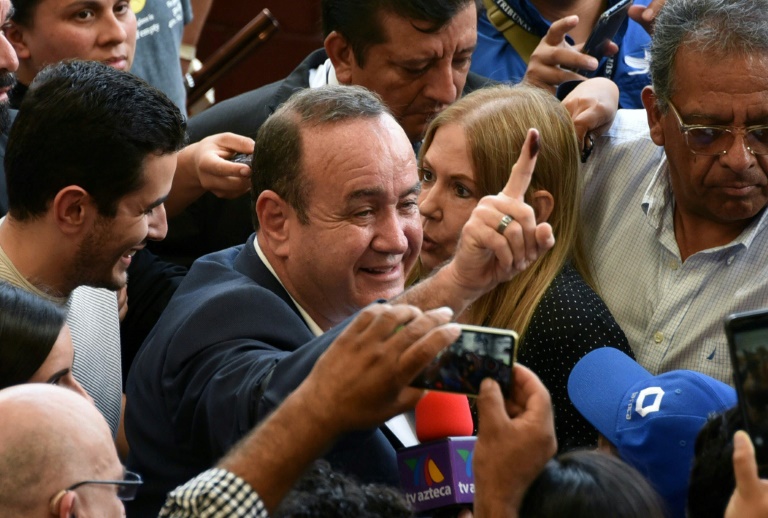
Conservative Alejandro Giammattei will be Guatemala's next president. (Photo: AFP)
Conservative Alejandro Giammattei has been elected president in Guatemala, sweeping to victory on promises to stem mass migrations to the United States by combating poverty, corruption and violence in the Central American country.
Giammattei defeated former first lady Sandra Torres in a run-off Sunday, garnering more than 58 percent of the vote. Torres, a social democrat, won 42 percent.
More than 99 percent of the ballots have been counted, according to Supreme Electoral Tribunal, whose president Julio Solorzano had declared the result "already irreversible" part-way through the count.
Nevertheless, turnout was low and preliminary data indicated more than 55 percent of eligible voters may have abstained, underscoring the challenges facing Giammattei.
"The aim is fulfilled," said Giammattei, a 63-year-old doctor who was defeated in three previous runs for president.
Giammattei will take over in January from corruption-tainted President Jimmy Morales, who congratulated his successor and promised a "transparent and orderly" transition.
He will be under immense pressure from the United States to implement a controversial migration pact that would allow Washington to send most Honduran and Salvadoran asylum seekers who passed through Guatemala back to the poor, crime-ridden country.
The two candidates had both avoided committing to strong positions on the US deal.
Corruption was the main issue leading up to the first round of elections in June -- which Torres topped -- but that has been superseded by the political scandal over the migration deal.
'Lose-lose scenario'
Neither candidate arrived with a glowing reputation.
The center-left Torres, whose ex-husband Alvaro Colom was president from 2008-2012, has been suspected of involvement in corruption.
Giammattei has not come off much better.
Investigative website Nomada branded him as "impulsive... despotic, tyrannical... capricious, vindictive," among other traits.
But he scored well on such voter concerns as the economy, corruption and security, according to Risa Grais-Targow of the Eurasia Group.
However, he now faces "a lose-lose scenario" regarding the highly unpopular migration pact with Washington that Morales agreed to last month, Grais-Targow said.
The agreement designates Guatemala as a "safe third country," enabling Washington to turn away asylum seekers who did not seek refuge there when passing through Guatemala.
The pact overrode an injunction by Guatemala's constitutional court, and sparked protests against it.
A poll commissioned by the Prensa Libre newspaper found that 82 percent of those surveyed opposed it.
'Risk of retaliation'
But US President Donald Trump had threatened Guatemala with a travel ban, tariffs and a tax on remittances if it did not yield, and Grais Targow said rejecting it now would run the risk of retaliation.
Remittances account for 12 percent of the country's GDP, according to the World Bank.
Guatemalans in the US sent home $9.3 billion last year, nearly as much as $10.5 billion the country earned from exports.
Almost 60 percent of Guatemala's 17.7 million citizens live in poverty, and the country has one of the highest murder rates in the world.
Around half the killings are blamed on drug trafficking and extortion operations carried out by powerful gangs.
Guatemalans are not subject to Trump's proposed migrant measures, but given that poverty in some indigenous areas reaches 80 percent, many embark on the journey in search of the "American dream" despite the dangers.
Since December, at least five Guatemalan children have died in US custody after crossing into the country from Mexico.
And in June, a woman and three children died from heat and dehydration in Texas.
"The problem is that as there's no work in Guatemala, many people want to migrate and it's sad what's happening to our Guatemalan brothers who die or are killed," Emilio Canel, a 26-year-old farmer in Sumpango, told AFP.
More than 250,000 Guatemalans were detained between October 2018 and July this year for trying to enter the US illegally, Washington's embassy said.


